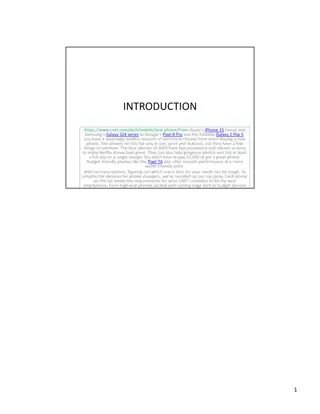
High-Demand Jobs in Kansas City: Opportunities and Industries
Discover the high-demand jobs in Kansas City across key industry sectors such as Advanced Manufacturing, Construction, Health Care, Technology, and Supply Chain & Logistics. Explore the top occupations, education requirements, and median annual wages in manufacturing and supply chain & logistics, highlighting the growth and opportunities in these fields.
Download Presentation

Please find below an Image/Link to download the presentation.
The content on the website is provided AS IS for your information and personal use only. It may not be sold, licensed, or shared on other websites without obtaining consent from the author. If you encounter any issues during the download, it is possible that the publisher has removed the file from their server.
You are allowed to download the files provided on this website for personal or commercial use, subject to the condition that they are used lawfully. All files are the property of their respective owners.
The content on the website is provided AS IS for your information and personal use only. It may not be sold, licensed, or shared on other websites without obtaining consent from the author.
E N D
Presentation Transcript
Demand Occupations in Kansas City and How to Get Them 10/27/2021 Sloane Gage Director of Program and Resource Development Workforce Partnership
POST-COVID LABOR MARKET Lowest rate of labor market participation in more than 40 years Record number of unfilled jobs Shrinking labor pool is a drag on economic growth Baby Boomer retirements more than doubled in 2020 Cost of child care has delayed return to the workforce 29% of jobless Americans, have been unemployed for at least a year, as of June-their job skills have lapsed.
WHAT DOES THIS MEAN FOR YOU? OPPORTUNITY. LOTS AND LOTS OF OPPORTUNITY. More jobs-KC Metro is expected to add 16,534 jobs from 2021-2022; highest growth in construction, manufacturing, transportation, technology and healthcare More money-demand for workers has increased wages across the majority of employment sectors
KEY INDUSTRY SECTORS Advanced Manufacturing Construction Health Care Technology Supply Chain and Logistics
HIGH DEMAND JOBS IN MANUFACTURING Occupation Education Median Annual Wage Assemblers and Fabricators High School Diploma or GED $38,350 Maintenance and Repair Workers High School Diploma or GED $39,040 Packaging and Filling Machine Operator High School Diploma or GED $36,090 Inspectors, Testers, Sorters High School Diploma or GED $38,130 Welders, cutters, solderers, brazers High School Diploma or GED $43,140 Production Supervisors High School Diploma or GED $63,160 Industrial Machinery Mechanics High School Diploma or GED $52,480 Heating, AC, and Refridgeration Mechanics and Installers High School Diploma or GED $53,370 Machine Tool Operators High School Diploma or GED $39,070 Production Workers High School Diploma or GED $30,108
HIGH DEMAND JOBS IN SUPPLY CHAIN & LOGISTICS OCCUPATION EDUCATION MEDIAN ANNUAL WAGE Automotive Service Technicians and Mechanics Postsecondary Certificate $43,690 First-Line Supervisors of Mechanics, Installers, and Repairers High School Diploma or GED $60,420 Heavy and Tractor Trailer Truck Drivers Postsecondary Certificate $47,240 Material Movers No Education Requirement $30,090 Stock Clerks and Order Fillers High School Diploma or GED $26,450
HIGH DEMAND JOBS IN HEALTH CARE Occupation Education Median Annual Wage Registered Nurse $65,920 Bachelor s Degree Nursing Assistant Postsecondary Certificate $28,030 Medical Assistant Postsecondary Certificate $33,990 Pharmacy Technicians High School Diploma or GED $34,410 Home Health Aide High School Diploma or GED $25,070 Licensed Practical and Licensed Vocational Nurses Postsecondary Certificate $46,930
HIGH DEMAND JOBS IN INFORMATION TECHNOLOGY Occupation Education Median Annual Wage Software Developers $83,400 Bachelor s Degree Computer User Support Specialists Postsecondary Certificate $46,310 Network and Computer System Administrators $76,950 Bachelor s Degree Computer and Information Systems Managers $126,060 Bachelor s Degree Computer Systems Analyst $76,350 Bachelor s Degree Database Administrators $85,630 Bachelor s Degree
HIGH DEMAND JOBS IN CONSTRUCTION Occupation Education Median Annual Wage Carpenters High School Diploma or GED $46,790 Construction Laborers No Education Requirement $40,260 Plumbers, Pipefitters, and Steamfitters High School Diploma or GED $71,010 Construction Managers $88,050 Bachelor s Degree Electricians Postsecondary Certificate $62,130 Cement Masons No Education Requirement $57,010 Civil Engineering Technicians $52,000 Associate s Degree
How Do I Look For Jobs? Search engines: Google, Indeed, LinkedIn, Monster, Glassdoor, ZipRecruiter, Simply Hired, Snagajob, KansasWorks Networking: make and leverage professional connections.
How Do I Apply for a Job? Create a resume to showcase your skills and abilities; be sure to include: 1. Extracurriculars 2. Relevant classes and GPA (over 3.0) 3. Volunteer positions 4. Work experience (even if its walking a dog, babysitting, etc.) Show responsibility. 5. Special skills-bilingual, technical skills
Functional Resume A functional resume focuses on your skills and experience rather than your work history. Once it is developed, you can add more work experience and tailor it for specific jobs.
What Should a Resume for a Student Include? Name and contact information (make sure to use a professional email address) Professional summary-briefmarketing pitch of a few sentences highlighting special skills and accomplishments. Education-name of high school, expected graduation date, GPA (if above 3.0), CTE Pathway (if applicable)
What To Include in Resume Special/technical skills: bilingual, technology proficiencies-be specific-(ex. Python, Java, Photoshop), certificates, licenses, capstone projects, relate to pathway courses and type of position you want to obtain. Extracurricular Activities Community Service/Volunteer Roles Awards, Honors, Accomplishments and Leadership Roles Work Experience
Resume Use simple and easy to read font such as Arial, Helvetica, Cambria, New Times Roman or Georgia Use 12 point size Do not use color or pictures One page that is formatted to highlight critical information Use link to LinkedIn profile or project work
Resume Do not include physical address on resume. Contact should be phone and email address. Do not include any personal information such as social security number. Do not use a formatted resume template- they often scan incorrectly and leave out important information.
How Do I Apply For a Job Start close to home-ask friends and neighbors about babysitting, mowing lawns, shoveling snow, etc. All show work ethic, responsibility and builds references. Advertise Your Job Search Check with Career Center and Local Workforce Centers Job Search Online and In Person Apply for any job that is entry-level and a good fit for your skillset
What Information Do I Need to Apply Resume-make sure contact information is current Know the information on your resume and be able to discuss it-especially skills Be prepared to discuss your ability to do the job you are applying for Availability (days and hours) Previous work history, including name and contact information of supervisor Three professional references, contact information and professional title
Good References Adult, non-family members that can provide a reference about your character and work ability Examples: teachers, coaches, pastors, past supervisors, volunteer coordinators, community leaders, anyone you have done paid or non-paid work for, parents of friends
What is Networking Networking is building a professional support system to provide information, opportunities, act as mentors, help achieve goals, and serve as references. Networking should take place before and during career process. Networking can be done online and in person. LinkedIn, LinkedIn Groups, school clubs, community organizations, job fairs are all great places to start building your network.
Interview Tips Arrive 10-15 minutes early-punctuality is key, but do not arrive so early that it disrupts the schedule of the interviewer Take care with dress and grooming. Show the interviewer you are professional and take the opportunity seriously. Wear conservative, wrinkle free clothing, minimal makeup, make sure nails are clean and groomed. Turn off your phone. Be polite and introduce yourself to everyone you meet during the interview process
Interview Tips Have several hard copies of your resume, information for references, and transcript if possible. Exude energy and a positive attitude Research the company and position you are interviewing for Be prepared to tell the interviewer how your skills align to the job and why you will be a good hire
Interview Tips Verbally practice telling the interviewer why you are a good fit for the job and what makes you the best candidate for the job Tell the interviewer what interested you in the job Be prepared to explain a time when you were challenged and how you overcame it Ask informed questions about the company and the position
Interview Tips Follow-up immediately after the interview with either a hand written note or email thanking the interviewer for his/her time and reiterating your interest and what you can bring to the company
Common Interview Questions Why did you apply for this job? Why are you interested in working here? Why do you think you are a good fit for this positon? How would you describe your ability to work as a team member? What do you think it takes to be successful in this position? What has been your most rewarding accomplishment? Tell me about a problem you have recently handled?
Who Can Help Me Learn About or Apply for Jobs? Everyone-tell everyone you talk to that you are looking for a job. Online job search engines like Indeed and KansasWorks Workforce Partnership Teachers, counselors LinkedIn and LinkedIn Groups
How Can I Tell if a Job Offers Opportunities to Advance Benefits-Companies that invest in their people offer good benefits Ask during the interview Research online Ask about training programs and tuition reimburse plans Size of the company






